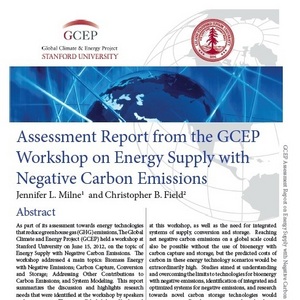Bioenergy combined with CCS could enable carbon-negative energy

Stanford University
February 19, 2013
BY Erin Voegele
Stanford University’s Global Climate and Energy Project has released a report highlighting the potential to combine bioenergy production with carbon capture and storage techniques to enable carbon-negative energy production.
"Net negative emissions can be achieved when more greenhouse gases are sequestered than are released into the atmosphere," said Jennifer Milne, an energy assessment analyst at GCEP and lead author of the report. "One of the most promising net-negative technologies is BECCS, or bioenergy with carbon capture and storage."
Information released by Stanford notes that typical BECCS systems convert biomass into electricity, chemicals or fuels. The carbon dioxide (CO2) released during the conversion process is then captured and stored. According to the university, this type of technology could be employed at power plants, ethanol plants, biorefineries, paper mills and other manufacturing facilities.
Advertisement
The report identifies a total of 16 BECCS projects in various stages of development around the world, including six ethanol projects, one gasification project and one pulp and paper project in North America. In addition, one Brazilian ethanol project, one African ethanol project, three European ethanol projects, two gasification projects in Europe and two European pulp and paper projects are included on the list. Each project stores CO2 either geologically or through beneficial reuse. One project in the Netherlands does both.
A press release issued by the university specifically highlights a project launched by the U.S. DOE at an Illinois-based ethanol plant in 2009. The project, located at an Archer Daniel Midlands Co. ethanol plant in Decatur, Ill., captures approximately 1,000 metric tons of CO2 per day from the biofuel fermentation process and sequesters it in a sandstone formation 7,000 below ground.
While BECCS projects hold significant potential for mitigating CO2 emissions, the report describes several challenges these projects currently face. According to the analysis, the fluctuating price of carbon presents a significant challenge, as does the absence of recognizing “negative” emissions in existing CO2 reduction incentive schemes. The authors of the report also point to scale-up, availability of sustainable biomass resources, and the high cost of carbon capture and storage as challenges.
Advertisement
With regard to biomass, the analysis also addresses the potential to mitigate CO2 emissions with biochar. According to information released by Sandford, one advantage of biochar is its simplicity. However, the researchers also stress that long-term CO2 sequestration would require high biochar stability.
A full copy of the report, titled “Assessment Report from the GCEP Workshop on Energy Supply with Negative Carbon Emissions,” can be downloaded from the Stanford University website.
Related Stories
The biodiesel industry has been facing turbulence, but the release of long-overdue policy could course-correct.
The U.S. House of Representatives early on May 22 narrowly passed a reconciliation bill that includes provisions updating and extending the 45Z clean fuel production tax credit. The bill, H.R. 1, will now be considered by the U.S. Senate.
U.S. EPA Administrator Lee Zeldin on May 21 stressed the agency is working “as fast as humanly possible” to finalize a rulemaking setting 2026 RFS RVOs during a hearing held by the U.S. Senate Committee on Environment and Public Works.
Clean Fuels Alliance America on May 22 delivered a letter to U.S. EPA Administrator Lee Zeldin, urging him to set the 2026 RFS biomass-based diesel volume at no less than 5.25 billion gallons and allow continued growth in the 2027 volumes.
A group of 28 House members on May 16 sent a letter to President Donald Trump urging his administration to adopt timely, robust Renewable Fuel Standard renewable volume obligations (RVOs) for 2026 and beyond.
Upcoming Events










